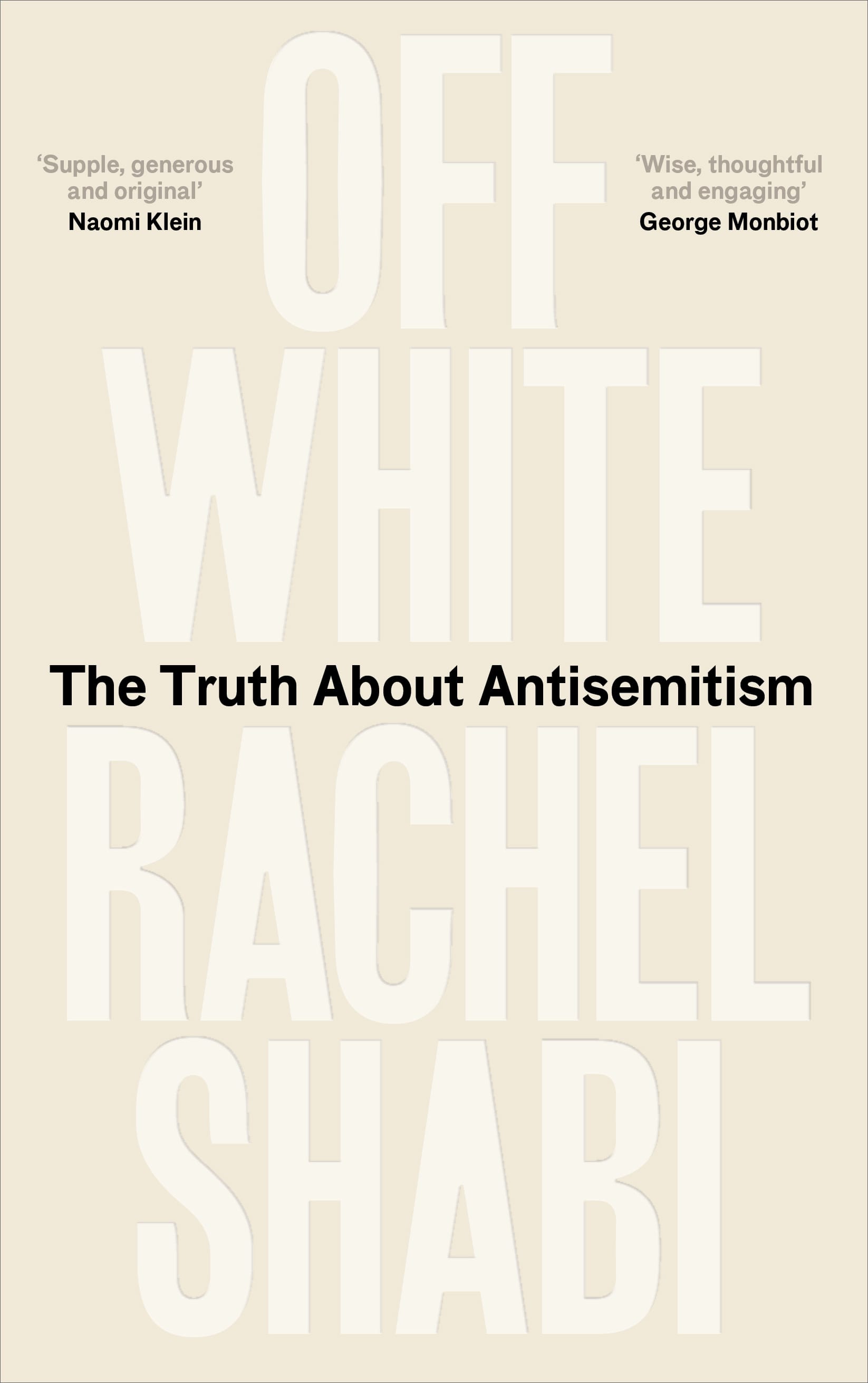Today, we hear a lot about antisemitism. It’s been discussed in relation to party politics here in the UK and has been increasingly referred to during the Israeli military attacks on Gaza, The West Bank and Lebanon abroad. There’s lots of discourse on the topic, but often it feels confusing, empty, one dimensional, shallow, said in bad faith or a divisive wedge that obfuscates rather than sheds much light on this centuries old prejudice.
Beyond the polarising headlines and talking points, award-winning journalist and broadcaster Rachel Shabi offers a different analysis in her new book Off White: The Truth About Antisemitism. Grounded in history, it explores understanding the capability of whiteness being conditional, pro-Israel antisemitism and the fight for Palestinian liberation. Naked Politics spoke to Rachel to find out more about how to make sense of all of this, and a more hopeful way forward for all.
Naked Politics: When I first saw the title of your book, I knew it was going to be interesting. Why did you choose to call it Off White?
Rachel: We played around a lot with this, but it speaks to how I think a lot of Jewish people are a racialised minority but at the same time have been sort of absorbed into whiteness, especially in the post World War era and after the Holocaust. Jewish people straddle this thing of showing up as a racialised minority that has been absorbed and upholds the structures of whiteness, but still isn't white. It's trying to navigate this thing of well, we're not not white, but we're also not white, so we're “off white”. A lot of Jewish people that I interviewed for this book articulated some version of that; not quite knowing how to put it in a world where we present as white.
Naked Politics: Lots of people –including on the left - also struggle with that idea that there is a kind of malleability to race and that a lot of Jewish people’s racialisation shifts or moves between being inside the tent and then outside the tent of whiteness.
Rachel: Exactly. I'm so glad you said that, and I really appreciate the way you just articulated it. That sense of contingency is ever present for a lot of Jewish people that I spoke with. It’s a community that is pretty well integrated and established on its face, and yet still feels that sense of contingency.
Naked Politics: What prompted you to write this book?
The concept was actually conceived a few years ago. The political media conversation about racism is generally horrendous. I don't think it's a particularly safe or constructive conversation and so I could see that manifest with the conversations we were having about antisemitism as well. On the one hand, you had progressive left movements manifesting blind spots about antisemitism, but then you'd have a political media conversation that seemed to prioritise antisemitism; they’ll talk about it more than would be the case for say, Islamophobia or anti-black racism. So there is this very divisive way of talking about racism that creates people who seem more worthy of a conversation than others. All the while, there's then very little focus on right wing antisemitism and the dangerous ways in which that manifests.

Naked Politics: You give a good overview at the start of the book on the history of Jewish people in Europe, especially in the UK. One fact that stuck out to me, was the English royal family employing Jewish people as usurers to extract wealth from the people, allowing them to gain lots of personal wealth whilst making Jewish people scapegoats. This isn’t something typically young people are learning in their history lessons - do you have any thoughts as to why that is?
Rachel: In Western societies generally, there is an information gap when it comes to understanding the involvement of Western countries in the origin story of different kinds of racism, whether that's antisemitism, anti-black racism, or Islamophobia. I also think it's the reality that antisemitism manifests as essentially a conspiracy about power. It's the powerful setting up a Jewish minority as a scapegoat to be the punch bag when things go wrong. Gary Younge said in a recent lecture that racism is a language that has many dialects; all these different kinds of racism are essentially dialects. We understand that they're different, but we also understand that they are fundamentally racism.
I also think that it's very difficult for Western societies - and we see this when it comes to slavery - to talk about these stories unless it's to say “yeah, but we're the good guys”. We have to have a redemption narrative. So, with slavery the emphasis is on abolishing it, but we were a major part of it for centuries. And so with antisemitism, there's this story in the UK that we fought and defeated Hitler and the Nazis, and therefore we're the good guys. There's this reluctance to look at a story prior to Hitler and the Third Reich: there were hundreds and hundreds of years of rampant antisemitism across Europe and indeed Britain in many ways, was the origin story of so much antisemitism.
Naked Politics: One of the things that you explore in the book is what's called the new antisemitism. Can you explain it and what in your view does it get wrong?
Rachel: Sometime in the mid 1970s, Israeli officials were looking at the backlash to the Israeli occupation of Palestine and thought that what they were looking at was not a global reaction to occupying and dispossessing Palestinian people, but rather a form of antisemitism that had reshaped itself to target the Jewish state of Israel. They repackaged antisemitism as being not against individuals and communities, like we saw play out in Europe and culminate in the horrendous Holocaust, but rather when we see people attacking Israel because it self-defines as the collective state for Jewish people.
In this world changing apocalyptic war in Gaza we’re now witnessing, we're seeing this “new antisemitism” manifest in anything and anyone that is critical of Israeli action, or crying out for a ceasefire, be accused of antisemitism. So that might include the UN, actors, campus students or people turning up to protests. It might even be Jewish voices or Israeli Jewish voices. It sees all of that not as a valid political opposition to the brutal policies of the Israeli Government, but rather as antisemitism.
Naked Politics: I often think this also puts Jewish people in danger; I think the phrase that you used in the book is “if everything is antisemitic, nothing is antisemitic.”
I think that's inevitably what happens if you use it in such a fashion. You're going to start seeing people take it less seriously. I think it puts everyone in danger ultimately. Yes 100% it targets, marginalises and can turn deadly towards Jewish people, but it’s also an animator of all kinds of other far-right, nativist, racist, reactionary politics that harms all of us.
Naked Politics: Even the far right are co-opting the fight against antisemitism. How have we got to this point where antisemitism has almost become “their issue”? How has the left allowed this shift to happen?
Rachel: The right wing is strategically and opportunistically filling the space of tackling antisemitism because the left wing has left a vacuum. Firstly, pretending to care a lot about antisemitism rehabilitates the far right. A lot of these far-right parties, whether it's in France, Germany or Hungary are rooted in Nazi era antisemitism; so they see it as a way to make themselves palatable in mainstream politics. It has also allowed them to carry on being rampantly Islamophobic, nativist and hateful of migrants in a really dangerous way because they could then say the real source of antisemitism is not Christian European societies that created, maintained and reproduced antisemitism, but Muslim communities.
Contrastingly, you have a far right that is also quite openly antisemitic. The Great Replacement Theory, which purports that the white majority Western societies are being swamped by Muslim and other non-white migrants - also pushes the idea that the people responsible for doing it are Jewish people. So that's a cocktail of many racisms, antisemitism, Islamophobia, anti-black racism, which is pushing a nativist, anti-migrant ideology into our politics and doing that in a fairly mainstream way.
Naked Politics: A lot of Naked Politics’ followers and readers are young people who see themselves as anti-racist. How can people ensure that fighting antisemitism is part of that broader fight for human rights?
Rachel: All of this is the ongoing work of anti-racism, isn't it? We're all on this journey of learning and understanding and I don't think it has an endpoint because there's so much for us to absorb and understand about the way different racism works.
We need to reconnect the fight against antisemitism to our anti-racist struggle. Rejoining the dots and seeing that actually racism throughout history has been borrowed and learned and copied, so antisemitism has copied from anti-black racism, which has also been copied from antisemitism.
It's a constant story of them cross-pollinating with each other, and for us to realise that the political conversation we're having about racism now is so unhelpful, so divisive and that we can create a much better conversation, one that serves all of us and keeps us united in the fight against racism.
Off-White: The Truth About Antisemistism is available to order now
Thanks for reading our article! We know young people’s opinions matter and really appreciate everyone who reads us.
Give us a follow on Instagram and TikTok to stay up to date with what young people think.

